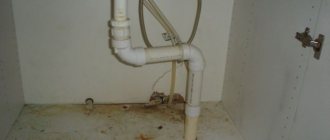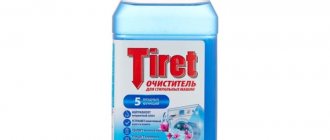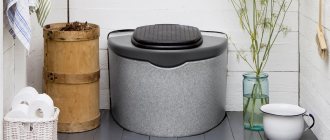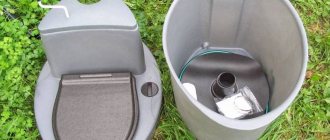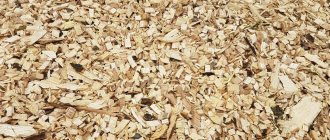From our material you will learn how to get rid of the smell from a cesspool, why it smells after pumping, and how you can eliminate the unpleasant odor.
The smell from a cesspool is not only a discomfort for you, but also the likelihood of conflicts with neighbors. Let's not prevaricate, because cesspools are often installed on a site without approval procedures. If a neighbor complains about the smell, and an inspection comes to you and reveals such a fact, you can receive a fine for violating the rules for landscaping the adjacent territory. Do you need it?
Therefore, let's look at the causes of the unpleasant smell from the cesspool and ways to eliminate this problem. Cleaning sewer pipes in St. Petersburg can help in this case, but if the cause of the spread of unpleasant odor from the cesspool is not eliminated, this measure will turn out to be temporary.
Content
- How to remove odor from a cesspool?
- Excessive wastewater accumulation
- How to remove odor from a cesspool without pumping?
- Chemicals to neutralize odor
- Biological cleaning agents
- How to prevent unpleasant odors from appearing?
Even if you don’t go to your dacha often, there is a high risk of an unpleasant odor coming from the toilet. Let us answer the question of what to put in a cesspool so that it does not stink, there is no unsanitary conditions and there is no danger of the spread of infections.
Siltation is the main cause of unpleasant odors.
Due to infrequent cleaning and improper use, silt may build up on the bottom and sides of the pit. By itself, it already smells bad, but its appearance also causes waste to accumulate too quickly and can overfill the tank and spill around it.
Signs of silting include not only an unpleasant odor, but also difficulties with flushing water from the toilet and bathtub, and seepage of wastewater from under the septic tank.
To fix the problem, you need to use the following methods:
- Download all contents . To do this, a vacuum truck with a special pump is called.
- Clean the walls from silt . This can be done manually, through chemical treatment or with special equipment.
- Carry out sanitization . Chemical compounds help not only get rid of the unpleasant odor, but also disinfect the septic tank and temporarily reduce the risk of repeated silting.
Sometimes the bottom gravel filter needs to be updated. The need for these actions is determined by specialists after examination.
There is no point in trying to personally eliminate siltation problems - it is difficult and requires the use of special equipment, which most owners of country toilets do not have at their disposal.
Folk remedies
How to get rid of odor using effective folk remedies? The important thing here is to remember to use the right products as often as possible, otherwise they will not be as effective as possible.
Sawdust will help you keep the pit relatively clean and odorless. It is best to use not very small, but medium and large sawdust from pine or spruce for cleaning - they best absorb the stench in the building and partially disinfect the air in the toilet room at the dacha.
Excessive wastewater accumulation
Another reason for an unpleasant odor is that the system was initially chosen incorrectly or has become unusable over time. In this case, the pit will fill up faster, and the filtration system will no longer cope with all incoming wastewater.
The only way out will be to re-equip the entire complex and install a new, more capacious septic tank. In order not to look for a way out of this difficult situation, it is worth thinking in advance whether the volume of the cesspool corresponds to the average amount of sewage created.
Ventilation
If the ventilation system in the room was provided at the stage of its construction, then the problem is solved by itself. When the air vent has not been taken care of, you need to build it yourself.
When heated in the sun, it will create additional draft , promoting high-quality removal of gases. A canopy is installed on top that will prevent precipitation and debris from entering the pit.
If there is no desire to install a pipe, then a window made in the wall can play the role of ventilation. It is recommended to place one hole as low as possible to the floor, and the second from above - at a distance of 15 cm from the ceiling. This will ensure the natural movement of air flows and its purification. To prevent insects from entering the toilet through the hole, it is sealed with mesh.
To make ventilation as efficient as possible, it is recommended to combine two methods - installing a pipe in a cesspool and making vents in the walls.
How to remove odor from a cesspool without pumping?
Sometimes it happens that the pit simply smells strongly and ruins the life of the residents of the house. This may occur due to incorrect design, outdated septic tank design, or location of the waste tank too close to the home.
In this case, you need to use special drugs. They neutralize the processes occurring in sewage and purify the air.
Let's consider two main types of agents - chemical and biological.
Chemicals for odor neutralization and methods of their use
When answering the question of how to remove the stench from a cesspool, you can choose two options. The first is chemical cleaning as a replacement for mechanical cleaning. The sewage has to be pumped out. Then the walls are treated with chemicals and the entire container is washed. The second approach is to pour or backfill the active drug directly into the filled septic tank.
The table shows three classes of remedies to get rid of the problem.
| Type of composition | Description |
| Nitrate cleaners | The basis is nitrates. To enhance their effectiveness, manufacturers add additional chemical components to the formulation. The main feature is high chemical aggressiveness. Nitrates are a very effective remedy - literally in the first hours you will feel that the smell has greatly decreased. But you need to use the composition very carefully. The effluent becomes even more toxic. If they spill onto the soil, they can poison it. Owners of old septic tanks are better off abandoning such chemicals - all vegetation on the site within a radius of several meters may die if a leak does occur. The same applies to old cesspools with an open bottom. |
| Acids | They provide high quality cleaning – they gradually dissolve sludge and solid waste. They peel off from the walls, fermentation stops, and the smell goes away. You cannot use acids if you have a plastic septic tank - there is a risk of burning a hole in it. Owners of open-bottom cesspools should also give up acids. |
| Ammonium | The safest type of chemicals. Gives a good effect of reducing unpleasant odors and cleans containers. But it is not suitable for residential buildings and places with highly chlorinated water. Even regular dishwashing detergents can neutralize its effects. |
Although many instructions on the Internet say that by purchasing chemicals you can do everything yourself, you should not believe this. It is difficult and dangerous to work with such products, especially if the septic tank is supposed to be completely drained. If the compositions come into contact with mucous membranes, they can cause severe burns requiring hospitalization. Even the vapors of some acids are poisonous. Damage may also be caused to your area.
Among the most popular formulations:
- "Methanediol" . This substance belongs to the class of formaldehydes. Toxic, requires careful handling. It is rarely used for cesspools in private areas; more often it is used to eliminate odor in industrial drainage systems.
- Instablue Campingaz . Another very powerful reagent. It cannot be poured into a filled cesspool; it is used as an aid during mechanical cleaning and removes deposits from the walls.
Biological cleaning agents as an alternative to chemical ones
What should you put in a cesspool so that there is no smell and the risk to plants and humans is minimal? Biologics may be considered. They stimulate the processing of wastewater by bacteria - this naturally eliminates the problem. You don’t have to worry about the sewer system or septic tank – they won’t damage it.
There are three main forms of such compositions on sale:
- In tablets . Best suited for small waste containers, approximately one cubic meter of capacity. A good solution for dry closets and self-contained showers. Many tablets must first be dissolved and only then poured into the pit.
- Liquid . Sold in cans, they are more concentrated. Suitable for large tanks. Solid waste gradually begins to dissolve, pathogenic microorganisms also die, which reduces the biological hazard of the sewage system.
- In granules . Depending on the variety, they may require dissolution or be poured into a waste storage facility unchanged. There are formulations with different degrees of concentration - you need to choose according to the volume of the septic tank.
Since this method of getting rid of stench is the most popular, let’s consider the most popular drugs and their features:
- "Doctor Robik." Many experts, when answering the question of how to fill a cesspool to prevent it from stinking, immediately recommend this type of drug. It has a good quality of dissolving most wastes that could potentially cause problems. Gives a long lasting effect. It is recommended to use the composition regularly so that the unpleasant odor does not appear at all.
- "Unique" . It gives a good level of destruction, and active bacteria do not die even in very aggressive environments. Another advantage is that the cleaning bacteria do not need air to live, so the septic tank does not have to be opened during cleaning, and this is a serious plus.
Biologically active additives
Activators are preparations with a high concentration of biologically active bacteria. For normal growth and life, microorganisms need a large amount of organic matter and a temperature of +0 C. During the processing process, organisms neutralize waste, break it down into water and fertilizer. Bioactivators also absorb odors and prevent the reproduction of insects.
Thanks to rapid recycling, the contents of the storage tank are reduced, which reduces the frequency of pumping out.
Rules for the use of biological activators:
- Soapy water and chemical components are not dumped into the drain pit. Even regular soap can kill bacterial colonies.
- Ensure sufficient air supply (ventilation) and maintain positive temperatures.
- Every year in the spring a new portion of bioactivators is placed in the pit. In winter, microorganisms die.
- For 1 m3 of waste, one tablet of the product is enough. Correct calculation of the additive is the main nuance. If there are a lot of bacteria, they will die of starvation; if there are few, they will not be able to process the entire mass.
Having allowed the colony to freeze due to seasonal frosts or die from soapy water, they give the remains time to rot or clean out the hole with a sewer truck. Then they launch a new portion of living organisms (throw in a tablet).
How to prevent unpleasant odors from appearing?
In order not to get rid of such a problem, you need to think in advance about how to prevent the appearance of stench. There are several ways:
- When designing, choose volumetric septic tanks designed for your number of consumers. It is always worth buying a container for sewage with a reserve, then it will not fill up too quickly.
- Regularly use special products to clean and reduce unpleasant odors. It is best to fill the septic tank with biological compounds containing anaerobic bacteria that do not require air for normal functioning.
- Call the vacuum cleaners more often . This will avoid silting and the appearance of an unpleasant odor.
Pay attention to periodic cleaning of pipes using mechanical methods or chemicals. This will help remove deposits at an early stage and the “aroma” will not appear.
If you entrust everything to specialists or take care of prevention in advance, the problem of eliminating unpleasant odor from a cesspool will not seem so difficult to solve.
You may also be interested in our class=”aligncenter” width=”800″ height=”500″[/img] Water for car wash
Pumping and removal of concrete waste
Mobile steam generator
| How to contact us: | |||
| +7 | Request a call back | ||
| [email protected] | Order a service online | ||
Special cases
Let's look at how to get rid of some characteristic odors that are unpleasant for the person himself and his environment.
Tobacco
The best way to get rid of tobacco smell on clothes is to smoke only outside the apartment, otherwise the smoke will gradually permeate all things. The following remedies will help free things from the spirit of tobacco.
Vacuum cleaner
The smell of tobacco accumulates on dust in clothes. Things are knocked out, covered with a damp cloth and vacuumed at high power.
Tip: It is useful to keep clothes near steam - hang things near a hot shower, over a basin of hot water, then dry them. The smell of tobacco also quickly disappears in the cold.
Coffee
The coffee beans are ground and placed in a fabric bag. The smelly items are loosely placed in plastic bags for several hours, with coffee sachets placed between them. Outerwear is dried near the radiator, on which a bowl of ground coffee is placed.
Citrus peels
The peels, packed in fabric bags, are placed directly with the items in the drum. The same bags are placed in clothing closets so that the smell of freshness permeates the clothes.
New things
If airing does not get rid of the smell of dyes or synthetic fabrics from new things, ammonia will help. Take 1-2 tablespoons of ammonia per liter of cold water and soak the new item for an hour, then wash it in the recommended mode.
Pets
Special sprays help get rid of the smell of cats, dogs, birds and other pets on clothes. A home remedy is to soak the item in a vinegar solution (2 tablespoons per liter of water).
Rotten aroma
The smell of rotten meat can be easily removed using citrus fruits. Squeeze lemon juice (dissolve citric acid) and add to water when washing, soaking or rinsing. Let us remind you that the product has a whitening effect.
Sweat
The smell of sweat ingrained into clothes sometimes remains even after washing in an automatic machine. Often the item cannot be washed, and the sweaty smell needs to be gotten rid of.
Oxygen stain removers
Oxygen bleaches dissolve all contaminants in fabrics, so they can also eliminate odors. Use only on items that can be bleached.
Laundry soap
72% laundry soap kills most bacteria and helps get rid of fatty particles. Rub soap onto dirty areas, leave for 5-10 minutes, wash the item and rinse well.
Dish soap or hair shampoo
Sweat contains fatty particles, so dishwashing detergents and shampoo dissolve them well. Contaminated areas are moistened, left for an hour, then washed.
Cold environment
If you don’t have time to tinker with clothes, you can take things out into the extreme cold or place them in the freezer for several hours. The smell of sweat will die along with the bacteria.
Vinegar essence
The essence is diluted to a concentration of 6-9% (table vinegar). Place it in a spray bottle and spray individual areas or the entire item. Allow to dry well and ventilate.
Fish
To remove fishy smell, soak clothes in solutions:
- laundry soap;
- vinegar;
- light - in bleach;
- shampoo, dish soap.
After washing, items are rinsed in cold water.
Traces of gasoline or diesel fuel are first removed with a stain remover. Then they fight the smell by soaking the clothes in a solution of ammonia, soda, lemon juice, laundry soap or hydrogen peroxide.
Helpful information
Tips that will be useful to all owners of outdoor toilets:
- in addition to treating the cesspool with special means, the toilet must be washed regularly using antiseptics;
- You can use air fresheners indoors—devices that operate automatically are convenient;
- the cesspool should be cleaned regularly - if it is overfilled, no strong remedy will be able to cope with the unpleasant odor;
- you need to think about the ventilation system at the stage of constructing the toilet;
- Chemicals must be used carefully, as they are not always safe for humans and the environment.
You will find a lot of useful and important information about removing various unpleasant odors from objects and surfaces in this section.
First thing
You may not believe me, but an autonomous sewer system in a private house should not emit an odor that is clearly noticeable even next to the cesspool. There are two mandatory conditions for this, it: a) is made correctly, b) is operated correctly.
It is difficult to provide “b” without “a”, and the effect is immediate. Therefore, the first way to eliminate the smell is to put the cesspool in order, for which:
- Achieve tightness of the ceiling. The easiest way is to cover the structure with a reliable ramp of logs, boards and roofing felt, and embank it with soil on top. Be sure to leave a tight hatch in the ceiling for cleaning.
- Ensure good ventilation of the cesspool. To do this, it is enough to buy three meters of PVC pipe with a diameter of 110 mm, and a plastic deflector for it. We install the pipe so that it passes through the ceiling, going 3-5 cm into the hole.
- To prevent the cesspool from serving as a breeding ground for flies, we place a net on the head of the pipe.
Something else?
So, smell is not a prerequisite for the operation of a cesspool. Moreover, it indicates violations caused by errors during construction or operation.
In particular, one of the reasons is the banal overflow of the structure with sewage, its untimely pumping. This happens occasionally, and the reason for this is the very principle of operation of the cesspool as a storage tank.
Septic tanks do not have this disadvantage. They not only collect, but purify and discharge wastewater.
The construction of a septic tank is a little more complicated than a high-quality cesspool. In addition, there are ready-made sets of septic tanks, the installation of which is “turnkey” even for a beginner in construction.
Installing such a device can be called the fourth, most effective way to combat the smell of a cesspool.
Source

